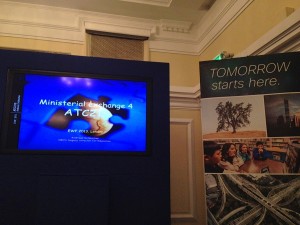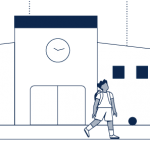
“Are assessments the Holy Grail in education or are they the Alchemist’s Stone?” This was the sentence used by Andreas Schleicher, Deputy Director for Education and Special Advisor on Education Policy to the Secretary-General, OECD to kick-off the workshop on the Assessment and Teaching of 21st Century Skills (ATC21S™) last week at the Education World Forum in London.
The workshop was a be a very insightful and dynamic session superbly led by Andreas, and considerably sparked by the active participation of five distinguished panellists as well as several EWF delegates who engaged in a very thought provoking debate about the importance of 21st Century skills, and the role assessments have in helping us understand their real magnitude.
The workshop included as panellists, representatives from the University of Melbourne (the institution leading the ATC21S™ collaboration), as well as from Australia and Costa Rica (two of the countries currently testing the ATC21S™ system), and from Sweden and Ireland (two countries about to embark on the ATC21S™ movement).
 The session started with reflections about the rapid changes the world has experienced in the past decades and the emergence of a series of innovations that have impacted the way we learn, work, live and communicate. As we progressed into the discussions, it became also clear that although innovation seems to be all around, it has taken a bit longer for it to arrive and settle in the education field; as one panellist put it: “everything seems to work against innovation in the education system”. Data on rising figures of worldwide youth unemployment contrasted with employers’ reported difficulties in finding talent inevitably makes us take a closer look at innovation and skills. Among the attendees, there seemed to be both a consensus around the importance of nurturing and measuring 21st Century skills, as well as common expectations about the role these skills play in the development of knowledge driven economies and more inclusive societies.
The session started with reflections about the rapid changes the world has experienced in the past decades and the emergence of a series of innovations that have impacted the way we learn, work, live and communicate. As we progressed into the discussions, it became also clear that although innovation seems to be all around, it has taken a bit longer for it to arrive and settle in the education field; as one panellist put it: “everything seems to work against innovation in the education system”. Data on rising figures of worldwide youth unemployment contrasted with employers’ reported difficulties in finding talent inevitably makes us take a closer look at innovation and skills. Among the attendees, there seemed to be both a consensus around the importance of nurturing and measuring 21st Century skills, as well as common expectations about the role these skills play in the development of knowledge driven economies and more inclusive societies.
ATC21S is all about bringing innovation to the education landscape and about encouraging educators, administrators, parents and policy makers to be bold, take chances, and seize new ideas and opportunities. But innovation is always difficult. The implementation of an initiative as ground breaking and transformational as ATC21S does not come without its challenges. However, one of the most reassuring things to hear from the delegates was that those challenges are pretty similar across countries (regardless their level of economic development or educational attainment). Resistance to change, fragmentation, overregulation, as well as multiple stakeholders with different agendas and priorities are just some of the roadblocks.
The Minister of Costa Rica, Hon. Leonardo Garnier, shared some of the experiences gathered in the trials of the ATC21S system. Most of the work has been done in the areas of translating tasks into Spanish, as well as adapting and localizing the tasks to the Cost Rican context. Some of their achievements have been to create precisely new culturally and linguistically appropriate tasks and materials; build a Spanish language ATC21S project website; participate in the first ATC21S webinar, and develop cognitive labs and the scale testing of collaborative problem solving tasks in 16 schools engaging about 500 students. For Costa Rica, one of the key values behind ATC21S is not only to be able to know more about the skills needed to succeed in the 21st Century and how they can be effectively assessed, but more importantly, to know how those skills can actually be transmitted to the student so they use them to build more equitable and prosperous societies. Being selected as one of the countries for running the tests on the ATC21S system is also enabling Costa Rica to become a role model for other Latin American countries that wish to be part of this process in the future.
Anthony Mackay, Deputy Chair of the Australian Curriculum, Assessment and Reporting Authority and Chair of the Australian Institute of Teaching and School Leadershipalsoshared the Australian experience with ATC21S and its relevance in helping Australia achieve education excellence by 2025. One of the fascinating aspects of the trials in Australia and in other countries is not only to see the number of right answers achieved by the student in the tests, but more importantly, what is the logical thinking and collaboration processes they follow before arriving to any particular answer. Representatives from Ireland and Sweden (two of the countries which are right now on the process of adopting ATC21S), shared that their main motivation for joining this ground breaking initiative does not only have to do with the issue of assessment but rather with the issue of using outputs to redesign curricula, raise the quality of learning in the classroom, and equip their youth with skills that ensure not only economic growth but also social progress.
Cisco entered the partnership with Intel and Microsoft to support the ATC21S collaboration led by the University of Melbourne because we believe developing 21st Century Skills is critical for the future of our students and the future of society. ATC21S is a formative system that links assessment with teaching and methodology within the framework of an ambitious vision for education transformation. But the key to success goes beyond having an ambitious vision and a desire to innovate; it relies in partnerships and collaboration; in working very closely with every group engaged in the education system; in identifying champions who believe in the process, and in giving them the tools and the empowerment needed to be successful.
So, after all, what was the answer to Andreas’ opening question? Are assessments the Holy Grail in education or are they the Alchemist’s Stone? Well, as we learned in the workshop, the answer probably lies in the middle. An integrated system like ATC21S though unique in its kind is also flexible enough to allow countries not only to re-evaluate their approach to the topic of assessment, but also to apply tools and outcomes towards the actual improvement of teaching and learning. The real challenge becomes in learning how to use those repositories of assessment data to effectively enact change in education. As Andreas Schleicher rightfully said: “ATC21S is not only about assessment per se; it is more about how we build the linkage between assessment, culture and teaching”.


CONNECT WITH US